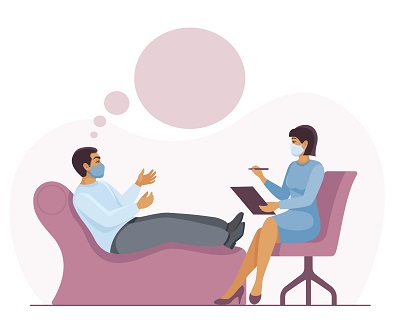Managing COVID-19 Fears as Mental Health Professionals
Managing COVID-19 Fears as Mental Health Professionals

The widespread fear and mass psychosis surrounding COVID-19 may be causing more harm than good for everyone’s mental health. Some fear of contracting COVID and the possibility of spreading it to others can keep us healthy. However, intense, and long-term fear has led to significant increase in self isolation, as social contact with friends, family members, and coworkers has significantly decreased. The mass public fear of contracting the virus is above and beyond a healthy level and causing a tremendous increase in psychiatric illnesses, stress levels, depression, anxiety, and suicidality1. The disruption of our normal life has impacted people’s sleep-wake cycles and food intake as they confine themselves at home, and social isolation has led to a dramatic increase in drug and alcohol abuse 2.
Many mental health professionals are now conducting patient visits virtually. I am one of the only psychologists left in my building who has stayed behind to continue in-person work while abiding by COVID protocols. Since our practice specializes in refractory OCD spectrum disorders and anxiety disorders a lot of the work done at our outpatient clinic requires in-vivo exposures, which cannot be replicated on Zoom.
Many anxiety disorders, which are on par with major medical illnesses such as heart disease, are on the rise superseding medical illnesses at an alarming rate. Paranoia of contracting COVID-19 by those who have not contracted it is astonishing. Shockingly professionals and experts in the mental health field often succumb to this fear. I only have one other colleague, head of the PTSD clinic at the VA, who is not fearful of coming into the office to continue in-person work with his patients. Every other professional I know in the field has left their office spaces, opting for virtual visits. I can count on one hand the professionals I know that have continued with in-person visits. As mental health clinicians we must set a good example for our patients whose fear of COVID may be exacerbating their pre-existing mental health conditions. How can we help them lessen their anxieties when we are setting our own example of fear by refusing to meet in person?
While historically people have always died from colds, upper-respiratory illnesses, and pneumonia, it has not been recorded or reported to the authorities to the extent it is recorded now. Self-tests purchased today require you to record results to the government, to keep track of all positive COVID-19 cases, even when these results are not always accurate.
At some point if the uncertainty and doubts are entertained at such elevated levels, phobia of pandemic may become a separate mental health illness. People are already displaying compulsive behaviors of looking up death rates, watching and reading media excessively, and avoiding friends and families for increasingly extended periods of time. The diversity of fears related to the pandemic should be investigated further before it becomes a DSM-6 diagnosis. Some measures must be taken to increase awareness and work towards ensuring that our patients’ mental health needs are addressed in the most effective way.
References
1 Quadros, S., Garg, S., Ranjan, R., Vijayasarathi, G., & Mamun, M. A. (2021). Fear of COVID 19 Infection Across Different Cohorts: A Scoping Review. Frontiers in Psychiatry, 12. https://doi.org/10.3389/fpsyt.2021.708430.
2 Babicki, M., Bogudzińska, B., Kowalski, K., & Mastalerz-Migas, A. (2021). Anxiety and Depressive Disorders and Quality of Life Assessment of Poles—A Study Covering Two Waves of the COVID-19 Pandemic. Frontiers in Psychiatry, 12.













